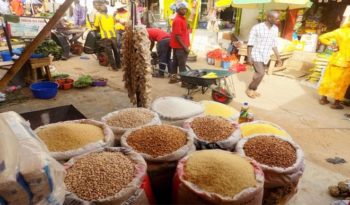The Federal Government has adopted some measures to reduce the price of food items in the country.
Minister of Agriculture, Chief Audu Ogbeh, disclosed this yesterday while addressing State House correspondents at the end of the Federal Executive Council, FEC meeting.
The Council had last week set up a task force to advise the government on how best to address the rising cost of food items across the country. Ogbeh said the task force submitted an interim report to the council yesterday, adding that the committee had identified that the hike in cost was “not due to shortage but high cost of transportation.”
He said food items were generally moved across Nigeria with heavy trucks and that the price of diesel which had gone up had, therefore, led to an increase in prices. The minister said the government had, therefore, decided to “start using railway wagons to transport food items.”
He said the use of wagons to transport cattle from the north to Lagos had already greatly helped in reducing cost and will be replicated in food distribution.
“We will also work with state governments to reduce delays experienced by trucks along the roads through all sorts of taxes by local governments,” he said.
He also said government had decided to adopt the “Ivory Coast model” in which trucks distributing food items are given special labels.
Also speaking, Minister of Investment, Trade and Industry, Enelamah said FEC also approved a set of measures to attract investment and boost local production of some essential commodities, such as tomatoes.
He said, ”Council approved a set of measures to boost production and attract investment into the Nigerian tomato sub-sector. This is a sector that has lots of farmers. In a state like Kano alone, there are 75,000 farmers and so it is important to encourage them.
“So we approved a set of measures to encourage them both in local production as well as attract more investment into tomato farming and processing.
“These measures will include things we are doing to make sure we plant tomato round the year; things like green house equipment, making sure that they can come in without any barriers or duties.
”They also include the use of both tariff and non-tariff measures to address the issues Nigerians are most concerned about, which is the issue of dumping, issues around quality and the standards of what we consume.”
Copyright Ships & Ports Ltd. Permission to use quotations from this article is granted subject to appropriate credit given to www.shipsandports.com.ng as the source.

